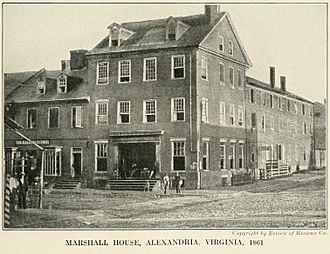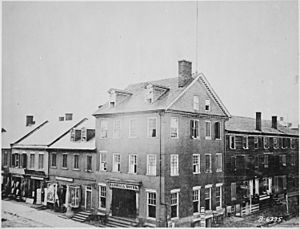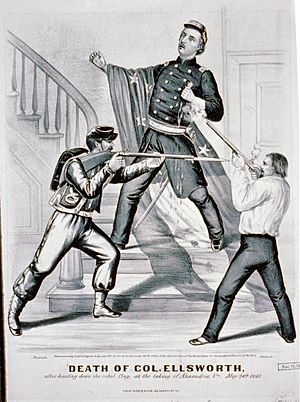Marshall House (Alexandria, Virginia) facts for kids
Quick facts for kids Marshall House |
|
|---|---|

The Marshall House Inn (photo 1861)
|
|
| General information | |
| Type | Hotel |
| Address | 480 King Street |
| Town or city | Alexandria, Virginia |
| Country | United States |
| Coordinates | 38°48′16.90″N 77°2′40.45″W / 38.8046944°N 77.0445694°W |
| Demolished | 1950s |
The Marshall House was a famous inn, which is like a hotel, located at 480 King Street in Alexandria, Virginia. This building became very important at the start of the American Civil War in 1861. It was here that a Union Army officer, Colonel Elmer E. Ellsworth, was killed.
Colonel Ellsworth was a well-known officer and a close friend of President Abraham Lincoln. His death was a big event for the Union side. He was the first Union officer to die in battle during the war.
Contents
The Marshall House and the Civil War
A Tragic Event
On May 24, 1861, Union soldiers took control of Alexandria. Colonel Ellsworth saw a Confederate flag flying on the roof of the Marshall House. He decided to take it down.
As he removed the flag, the inn's owner, James W. Jackson, shot and killed him. Immediately after, one of Ellsworth's soldiers, Francis E. Brownell, shot and killed Jackson.
Ellsworth's death became a rallying cry for the Union. People remembered him and thousands joined the army. For the Confederacy, Jackson became a hero who died defending his home.
After the Incident
Colonel Ellsworth's body was taken to the White House in Washington, D.C. He was honored there, lying in state for people to see. Many Union supporters enlisted in the army, using "Remember Ellsworth" as a slogan. One group of soldiers even called themselves the "Ellsworth Avengers."
Soldiers and visitors took pieces of the flag and parts of the inn as souvenirs. They especially wanted pieces of the stairway and floor. After the war, the Marshall House became home to small businesses. It still attracted many tourists from both the North and the South.
The building was mostly rebuilt after a fire in 1873, which someone started on purpose. The Marshall House was finally torn down around 1950. Today, a special sign in Alexandria tells the story of the Marshall House. It includes old photos and information about its history.
Remembering the Past
The Controversial Plaque
In 1999, a historian named James W. Loewen wrote about a bronze plaque at the site of the Marshall House. This plaque was placed by the Sons of Confederate Veterans. It was on the side of a hotel that was built where the Marshall House once stood.
The plaque described James W. Jackson as the "first martyr to the cause of Southern Independence." It said he was killed while defending his property and rights. The plaque did not mention Colonel Ellsworth at all.
The full text on the plaque read:
THE MARSHALL HOUSE
stood upon this site, and within the building
on the early morning of May 24,
JAMES W. JACKSON
was killed by federal soldiers while defending his property and
personal rights as stated in the verdict of the coroners jury.
He was
the first martyr to the cause of Southern Independence.
The justice of history does not permit his name to be forgotten.
–––––––––––––––– O –––––––––––––––
Not in the excitement of battle, but coolly and for a great principle,
he laid down his life, an example to all, in defence of his home and
the sacred soil of his native state.
VIRGINIA
In 2013, some people in Alexandria wanted the plaque removed. City officials said they could not remove it because it was on private property. However, in 2016, a new hotel owner bought the building. By October 2017, the plaque was removed. It was given to a local group called the United Daughters of the Confederacy.
Historic Items and Souvenirs
Pieces of History
After Colonel Ellsworth's death, many items connected to the event became valuable souvenirs. President Lincoln himself kept the Confederate flag that Ellsworth had taken down. Lincoln's son, Tad, often played with and waved this flag.
Today, most of this flag is kept at the New York State Military Museum in Saratoga Springs. The museum also has Ellsworth's uniform. You can see a hole in the uniform where a bullet likely entered.
The Smithsonian Institution's National Museum of American History in Washington, D.C., has other items. These include a piece of the flag, a blood-stained piece of floor covering, and a scrap of red fabric from the Marshall House. Another piece of the flag is at Bates College in Maine.
In 1894, Francis E. Brownell's widow offered to sell small pieces of the flag. She sold them for $10 and $15 each. A piece of the flag that Brownell gave to a friend was sold much later in the 21st century.
The Fort Ward Museum and Historic site in Alexandria displays Ellsworth's kepi (a type of hat) that he wore when he was killed. They also have patriotic envelopes with his picture. A star from the flag, still stained with Ellsworth's blood, is also there. Even the letter "O" from the Marshall House sign, taken by a soldier, is on display.
When the hotel was built on the site, archaeologists found many old items. These items are now preserved. You can see them at the Alexandria Archaeology Museum, located in the Torpedo Factory Art Center.
Images for kids
 | May Edward Chinn |
 | Rebecca Cole |
 | Alexa Canady |
 | Dorothy Lavinia Brown |





